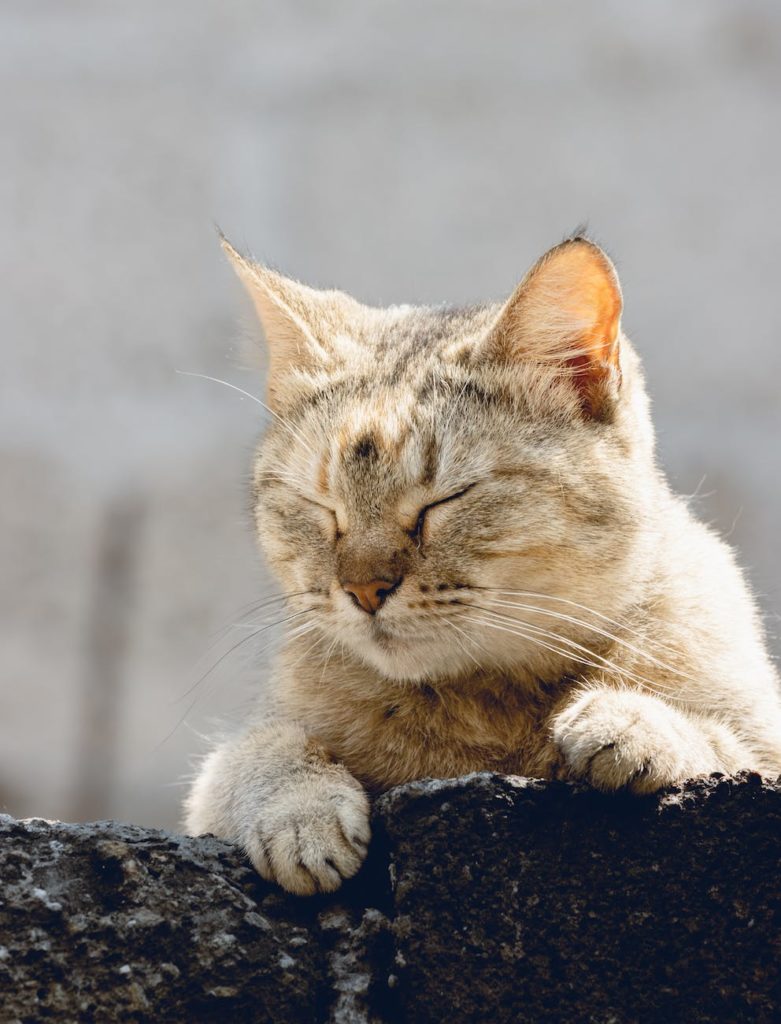Stop Your Cat from Waking You
We understand how frustrating it can be when your cat wakes you up in the middle of the night. Stop Your Cat from Waking You. Whether it’s scratching at the door or meowing incessantly, it can disrupt your sleep and leave you feeling exhausted the next day. But fear not, because we have a step-by-step plan to help you stop your cat from waking you up at night.

The Ultimate Bedtime Routine Guide
Are you tired of your cat’s nocturnal antics disrupting your sleep? Do you dream of a peaceful night’s rest without being nudged, pawed, or meowed at? Stop Your Cat from Waking You. Well, fret no more! This ultimate bedtime routine guide is here to help you transform your furry friend into a slumbering angel.
With these seven game-changing steps, you’ll be well on your way to a blissful night’s sleep, free from feline interruptions. Stop Your Cat from Waking You. So, grab your catnip, dim the lights, and let’s embark on this journey to a peaceful night’s sleep for both you and your beloved feline companion.
1. Understanding Your Cat’s Nighttime Behavior: A Guide to Peaceful Sleep
Before diving into the world of bedtime routines for your feline friend, it’s essential to unravel the mystery behind their nocturnal habits. Stop Your Cat from Waking You. Cats are crepuscular creatures, meaning they naturally experience a burst of energy at dawn and dusk. This innate tendency, combined with a healthy dose of individual preferences, can lead to a symphony of meows and playful antics as you try to catch some shut-eye.
Your cat’s age, breed, and personality play a crucial role in their nighttime behavior. Kittens, fueled by boundless energy and an insatiable urge to explore, are notorious for their playful antics, often extending into the wee hours. Stop Your Cat from Waking You. Conversely, older cats might become more vocal during the night due to changes in their sleep patterns or medical conditions. Some breeds, like Siamese and Bengals, known for their chatty nature, might serenade you with meows throughout the night, simply because they enjoy a good conversation.
By understanding your cat’s individual needs and their natural inclinations, you can tailor a bedtime routine that caters to their specific quirks and preferences. Stop Your Cat from Waking You. This will help bridge the gap between your desire for a peaceful slumber and your cat’s yearning for nighttime adventures. The journey to a harmonious sleeping arrangement starts with acknowledging the unique personality and biology of your furry companion.
2. Unwind the Wild Within: Scheduling Energetic Playtime Before Bed for a Peaceful Night
Cats, with their inherent predatory instincts, crave activity. To prevent their pent-up energy from wreaking havoc during the night, a pre-bedtime energetic playtime session is essential. Stop Your Cat from Waking You. Dedicate 15-20 minutes to engaging your feline friend with stimulating toys like feather wands, laser pointers, or crinkly balls.
This burst of activity serves a dual purpose: physical and mental exhaustion. Stop Your Cat from Waking You. By engaging their natural hunting instincts and providing an outlet for their playful energy, you’ll leave your cat pleasantly tired and ready to settle down for a peaceful night.
Think of it as a pre-bedtime workout for your feline athlete. Just like humans, cats benefit from expending energy before settling in for the night. Stop Your Cat from Waking You. This not only helps them sleep soundly but also reduces the likelihood of them engaging in disruptive nighttime behaviors like meowing, scratching, or running around the house.
Here are some additional tips for a successful pre-bedtime playtime:
- Create a consistent routine: Schedule the playtime session at the same time each night, establishing a rhythm for both you and your cat.
- Choose the right toys: Opt for interactive toys that encourage movement and engagement, like feather wands that mimic bird flight or laser pointers that trigger their hunting instincts.
- Let them win: While it’s important to provide a good workout, allow your cat to “catch” the prey occasionally. This boosts their confidence and provides a sense of accomplishment.
- End on a positive note: Conclude the playtime with a treat and affectionate praise, ensuring a positive association with bedtime.
By incorporating this energetic playtime into your cat’s evening routine, you’ll not only contribute to their physical and mental well-being but also create a more peaceful and restful nighttime environment for both of you. Stop Your Cat from Waking You. Remember, a tired cat is a happy cat, and a happy cat makes for a happy human!
3. Tempting Your Cat with a Bedtime Feast: A Recipe for a Purrfect Night’s Sleep
Cats are notorious for their nocturnal antics, often disrupting our sleep with untimely demands for food or attention. Stop Your Cat from Waking You. By harnessing their love for food, we can create a delicious and strategic solution – a tempting bedtime feast.
The key to this strategy lies in understanding feline dietary needs. Opt for a high-protein, low-carbohydrate meal that will provide sustained energy throughout the night, keeping your furry friend satiated and less likely to disturb your slumber. Wet food, with its higher moisture content, is an excellent choice, or a small portion of their regular dry kibble can do the trick.
The timing of this special meal is crucial. Offer it right before bedtime, allowing your cat to indulge in their culinary delight while you prepare for a peaceful night’s rest. Stop Your Cat from Waking You. This pre-emptive approach not only satisfies their hunger pangs but also distracts them from waking you up for a midnight snack.
Here are some additional tips to enhance the effectiveness of this strategy:
- Variety is key: Rotate between different wet food flavors or brands to keep your cat’s taste buds engaged and prevent boredom.
- Warm it up: Gently warming the wet food can release enticing aromas, further stimulating your cat’s appetite.
- Create a routine: Establish a consistent bedtime feeding schedule to help regulate your cat’s internal clock and solidify the association between mealtime and sleep.
- Monitor their intake: While offering a bedtime meal is beneficial, ensure portion control to avoid overfeeding and potential weight gain.
By implementing this tempting bedtime feast, you can transform your cat’s nighttime behavior, replacing unwanted nocturnal awakenings with peaceful purrs and a contented slumber. Stop Your Cat from Waking You. Remember, a well-fed feline is a happy feline, and a happy feline leads to a happy – and well-rested – you.
4. Create a Cozy Cat Bed: An Invitation for Restful Sleep
Cats, with their independent spirit and penchant for napping, often gravitate toward our beds. Stop Your Cat from Waking You. While sharing a bed with your feline companion can be undeniably sweet, it can disrupt both your sleep and theirs. Providing your cat with their own designated sleep haven can resolve this conflict and ensure restful nights for both of you.
Designing the Ideal Cat Bed:
- Comfort and Coziness: Invest in a plush, comfortable cat bed that caters to their natural love for snuggling. Soft blankets or a repurposed cardboard box lined with fabric can also create a welcoming haven.
- Strategic Placement: Choose a tranquil location for the bed, ideally in a room they frequent. A quiet corner of your bedroom, the living room, or a sunny window ledge are excellent choices.
- Personalization: Add your cat’s favorite toys or blankets to personalize their space and make it even more inviting. Consider placing a piece of your clothing inside, as the familiar scent will provide comfort and security.
Tempting Alternatives:
While the designated bed serves as the primary sleeping haven, offering additional cozy spots around your house can further deter them from your bed:
- Perch Up High: Cats adore elevated spaces. Invest in a cat tower or create shelves near windows so they can observe their domain.
- Box Bonanza: Cats are naturally drawn to boxes. Leave cardboard boxes in different corners, lined with blankets for extra snuggles.
- Sun-drenched Comfort: Place a soft blanket on a windowsill, transforming it into a warm basking spot for them to enjoy.
By creating these inviting spaces and establishing your own bedtime routine, your cat will learn that their own designated havens offer the ultimate comfort for a peaceful night’s sleep. Stop Your Cat from Waking You. They’ll be less inclined to hop on your bed, granting both of you the rest you deserve.
5. Unwind and De-Stress: Implementing a Calming Bedtime Ritual for Your Cat
As the world outside settles for the night, it’s time to help your feline friend do the same. Stop Your Cat from Waking You. Just like us, cats thrive on routine, and a calming bedtime ritual is a wonderful way to signal that it’s time to wind down and prepare for a peaceful night’s sleep.
Consistency is the cornerstone of success here. Stop Your Cat from Waking You. By creating a predictable and soothing routine, you’ll be helping your cat associate these actions with bedtime, making the transition to sleep smoother and more enjoyable.
Dim the Lights, Set the Mood:
As the day fades into dusk, start by dimming the lights in your home. Stop Your Cat from Waking You. This mimics the natural decrease in light that occurs as the sun sets, sending a subtle signal to your cat’s body that it’s time to wind down. You can also use lamps or nightlights to create a soft, calming ambiance.
Music to Their Ears:
Soothing music can work wonders for both you and your cat. Stop Your Cat from Waking You. Opt for calming classical tunes, gentle instrumentals, or nature sounds to create a relaxing atmosphere. Avoid anything too stimulating or upbeat, as this might have the opposite effect.
Gentle Touches, Purrfect Moments:
Cuddling, petting, and brushing are not only enjoyable for your cat but also a fantastic way to promote relaxation. Stop Your Cat from Waking You. Spend some quality time grooming your feline friend, focusing on gentle strokes and calming massages. This will not only strengthen your bond but also help them unwind before bed.
Playtime, But Make it Calming:
If your cat is the playful type, consider a short and gentle play session before bedtime. Opt for calming activities like feather wand games or chasing laser light dots. Stop Your Cat from Waking You. This will help them release any pent-up energy in a controlled manner, making them more receptive to settling down afterwards.
The Power of Routine:
The key to a successful bedtime ritual is consistency. Stick to the same routine every night, including the order of activities and the time you start. Stop Your Cat from Waking You. This predictability will help your cat anticipate bedtime and make the transition smoother.
Rewarding Relaxation:
Positive reinforcement goes a long way. Offer your cat a small treat or extra cuddle after completing the bedtime ritual. Stop Your Cat from Waking You. This will help them associate the routine with positive experiences, making them more likely to cooperate in the future.
By implementing a calming bedtime ritual, you’ll be creating a peaceful and predictable environment for your cat, allowing them to drift off to sleep feeling relaxed and content. Stop Your Cat from Waking You. Remember, consistency is key, and with a little patience and dedication, you’ll be helping your feline friend enjoy sweet dreams night after night.
6. Ignoring Unwanted Nighttime Behavior: A Step-by-Step Guide
Addressing nighttime disruptions caused by your feline friend requires patience, consistency, and a firm understanding of feline psychology. Stop Your Cat from Waking You. While it may seem tempting to engage with your furry companion when they rouse you from slumber, doing so can inadvertently reinforce the very behavior you wish to eliminate. Here’s how to effectively ignore unwanted nighttime antics:
Step 1: Acknowledge the Root Cause
Cats are crepuscular creatures, meaning their natural activity peaks during twilight hours. This inherent rhythm, coupled with possible boredom or a desire for attention, can manifest as disruptive behavior during the night. Stop Your Cat from Waking You. Addressing these underlying factors through scheduled playtime, interactive toys, and environmental enrichment can significantly reduce nocturnal disturbances.
Step 2: Implement the Ignore Strategy
When your cat disrupts your sleep, resist the urge to respond, even if their meows are heart-wrenching. Stop Your Cat from Waking You. Any form of attention, including negative interactions like scolding, can be misinterpreted as a reward by your feline friend. Instead, turn your back, avoid eye contact, and silently ignore their antics.
Step 3: Exercise Patience and Consistency
Breaking ingrained patterns takes time and unwavering commitment. While the first few nights might test your resolve, staying consistent with the ignore approach is crucial. Stop Your Cat from Waking You. Eventually, your cat will realize that their nighttime antics don’t elicit the desired attention, leading to a decrease in the disruptive behavior.
Step 4: Reinforce Positive Nighttime Behavior
While ignoring unwanted behavior is essential, acknowledge and reward desirable actions. If your cat sleeps peacefully throughout the night, shower them with praise and affection in the morning. This positive reinforcement helps solidify the association between good nighttime behavior and pleasant consequences.
Step 5: Seek Professional Help if Needed
If the problem persists despite consistent effort, consult a veterinarian or animal behaviorist. Underlying medical conditions or specific behavioral triggers could be contributing to your cat’s nocturnal disruptions. A professional assessment can identify potential causes and recommend tailored solutions for a peaceful night’s sleep for both you and your feline companion.
Remember, addressing unwanted nighttime behavior requires understanding your cat’s motivations and employing effective communication through positive reinforcement and consistent, non-reactive responses. With patience and dedication, you can successfully guide your furry friend towards restful nights and undisturbed slumber for everyone involved.
7. Ruling Out Underlying Medical Issues in Your Cat’s Nighttime Behavior
If your cat’s nighttime disturbances are persistent or accompanied by other unusual behaviors, it’s crucial to rule out any underlying medical issues. A visit to your veterinarian is highly recommended to discuss your concerns and explore potential causes.
Several medical conditions can impact a cat’s sleep patterns and behavior. Here are some common culprits:
- Hyperthyroidism: This condition, caused by an overactive thyroid gland, can lead to increased energy levels, restlessness, and changes in appetite and vocalization.
- Cognitive Decline: Similar to Alzheimer’s in humans, cognitive decline in cats can cause confusion, disorientation, and changes in sleep-wake cycles.
- Pain: Chronic pain from conditions like arthritis or dental disease can make your cat restless and vocal at night, seeking comfort or attention.
- Neurological Disorders: Certain neurological disorders can affect a cat’s sleep patterns and behavior, causing them to be disoriented or restless at night.
- Infections: Infections, especially in the urinary tract, can cause discomfort and lead to increased urination and vocalization at night.
Addressing any underlying medical issues promptly is essential not only for improving your cat’s sleep but also for their overall well-being. During your veterinary visit, provide a detailed description of your cat’s nighttime behavior, including the frequency, duration, and any additional symptoms you’ve observed. This information will help your veterinarian narrow down the potential causes and recommend the appropriate diagnostic tests and treatment options.
Remember, early diagnosis and treatment can significantly improve your cat’s quality of life and prevent medical conditions from worsening. Don’t hesitate to seek professional help if you suspect your cat’s nighttime disturbances are more than just a behavioral quirk.

Tire Your Cat Out Before Bedtime
Cats are naturally active animals, and if they haven’t had enough exercise during the day, they’re more likely to be restless at night. Make sure to spend some time playing with your cat before bedtime, using toys that encourage them to run and jump. This will help to tire them out and ensure they’re ready for a good night’s sleep.
Establish a Bedtime Routine
Just like humans, cats thrive on routine. Try to establish a consistent bedtime routine for your cat, including feeding them at the same time each night and playing with them before bed. This will help to signal to your cat that it’s time to wind down and prepare for sleep.
Provide a Comfortable Sleeping Environment
Make sure your cat has a comfortable sleeping environment, with a cozy bed and plenty of soft blankets. Cats also love to snuggle up in enclosed spaces, so consider providing them with a cat cave or igloo bed. This will give them a sense of security and help them to feel more relaxed at night.
Live Pee Free! Odor Eliminator 100% Eliminates Pet Odor on Contact. 20% Off. No Enzymes, No Fragrance, No Detergent, No Bleach – Safe for Kids and Pets.Use Positive Reinforcement
Positive reinforcement is a powerful tool when it comes to training your cat. If your cat wakes you up at night, avoid shouting or punishing them. Instead, use positive reinforcement to encourage good behavior. For example, if your cat stays quiet through the night, reward them with a treat in the morning.
Use a White Noise Machine
Cats are sensitive to sound, and even the slightest noise can wake them up. Consider using a white noise machine in your bedroom to help drown out any background noise and create a peaceful sleeping environment for both you and your cat.
Consider a Vet Check-Up
If your cat’s nighttime behavior is out of character, it’s possible they may be experiencing an underlying health issue. Consider taking your cat to the vet for a check-up to rule out any medical problems that may be causing them discomfort or anxiety.
By following these six steps, you can help to stop your cat from waking you up at night and ensure both you and your feline friend get a good night’s sleep. Remember, it may take some time for your cat to adjust to the new routine, so be patient and consistent with your efforts.



